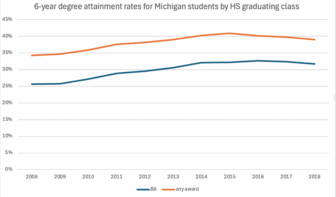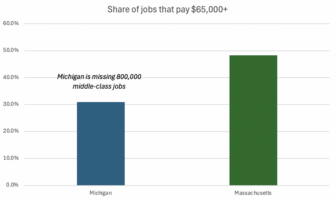
One thing we have learned as we’ve met with people across the state of Michigan about the need to reform education so that students are learning broad skills (we have adopted the 6Cs as the definition of those skills) is that some of the places naturally designed and driven to foster those skills are youth development and other community-based programs. These programs might be organized around golf, the arts, robotics, or environmental science—and indeed, those themes might be the “content” that a program is trying to teach—but the leaders and educators I’ve met from this sector aren’t in it because they prioritize the development of excellent golfers. They talk about leadership development, perseverance, social skills, self-regulation, confidence, and all the other capacities that they believe their programs develop in young people. And many of them are now stepping in to help their communities transition to a remote-learning plan that reflects the same desire to build critical skills in young people.
The content of a youth development program—sports, arts, STEM, etc.—is often a passion of the adults involved. And the programs they design are engaging because they are the manifestation of their passion for that topic. Their enthusiasm is contagious; their passion is a tool for engagement. A commonality of many great teachers is that same contagious enthusiasm. But teachers today are pressed by our accountability system to emphasize a narrow set of content standards that are measured on standardized assessments, which limits their ability to teach to their passions. The community-based organizations who work with young people have no such policy handcuffs.
Our observations about the community-based groups echoes the findings of one of our favorite books of the last few years, In Search of Deeper Learning: The Quest to Remake the American High School by Jal Mehta (also one of the creators of the Imagining September framework I shared last week) and Sarah Fine. Mehzta and Fine report that often, the places they saw the greatest evidence of deeper learning occurring, even in highly regarded schools, was not in English or math, but in extracurriculars and classes that are often considered “specials:” journalism, art, theater, etc. Mehta and Fine write:
…Such contexts often harness the power of an apprenticeship model in which real-world domains of professional practice provide standards for good work, teachers model expertise and conviction, and students gradually are inducted into more and more complex aspects of the professional activity. This constellation of qualities infuses the learning with depth, meaning, and a palpable sense of momentum—the very qualities that are often lacking in mainstream academic classes (p.34).
We believe some of the same benefits are observable in youth development programs. And we’ve been delighted to get to know some particular out-of-school educators on the west side of the state, who, as a follow-up to our Outsmarting the Robots event in 2019 (event summary here and here), have been talking about how to make sure more kids have access to the type of high-quality, 6Cs-developing projects and activities that they offer. While our discussions about a larger collaboration have been sidelined by the virus, we realized that many of these organizations had projects already available that could be used by overwhelmed teachers and families to supplement in-person or at-home learning. Considering our concerns about the quality of distance learning that’s available, spreading the word about these projects seems important.
You can check out the projects of our friends at the Van Andel Education Institute, Grand Rapids Public Museum, and John Ball Zoo via links in this article. Thanks to Erin Albanese of the School News Network for the nice write-up of the important opportunity to make distance learning better, and more available, for more kids.







